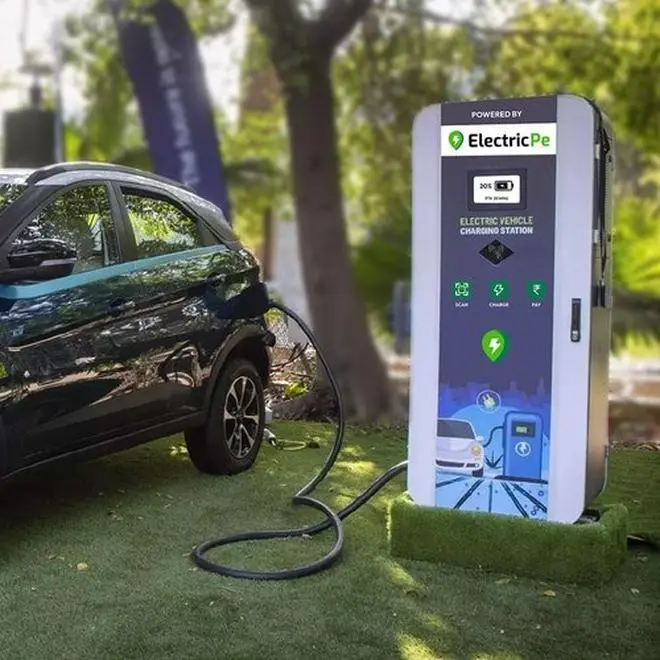Vikas Rao didn’t dare use his electric vehicle (EV) on long drives for fear of draining the battery en route without a reliable means to recharge it.
The 250-km drive from Mumbai to Shirdi appeared impossible until Rao discovered there were five high-speed charging stations along the way. “The availability of the charging stations removed my anxiety,” says the 37-year-old software professional.
Like Rao, more EV owners are now venturing to travel long distances, reassured by the improving network of charging stations across the country
In 2023 alone, the Indian EV charging infrastructure segment registered 18 deals valued at $188.5 million. Further, according to data compiled by market intelligence platform Tracxn, the sector has raised over $46.7 million so far this year across three rounds. In 2022, it raised $97 million.
Startup energy
There are around 2,700 public charging stations with 5,500 connectors in India, but these are concentrated in nine big cities and along highways and expressways. The target is to set up 10,000 public charging stations by 2025. The share of fast chargers — which run on direct current and can power up a car in 35 minutes — is only inching up, however.
The entry of startups promises to rev up the expansion of the EV charging network.
ElectricPe, an EV charging platform launched in April 2022, offers an app to locate EV charging stations. Its digital wallet can be used to pay for the charging.
The company today boasts the largest charging network in Bengaluru, with 20,000 points.
“We have about 45 per cent market share in Bengaluru. We’ve created communal or community charging facilities,” says Avinash Sharma, co-founder and CEO, ElectricPe.

ElectricPe boasts the largest charging network in Bengaluru
For those running the charging points, the startup provides free software to manage multiple locations from a single application, including real-time monitoring.
“We give the software free of cost… as currently the utilisation is very less,” says Sharma, explaining that the move has helped onboard more operators.
However, ElectricPe is not in a hurry and wants to expand one city at a time. It targets launching in two to three more cities this year.
ChargeZone, which focuses on EV four-wheelers and trucks, has set up over 2,000 charging stations with 4,200 charging points, of which 3,600 are fast-charging.
“We are increasing the count by one charging station a day. That’s our current run rate. We are present across 75-plus locations and electrified more than 30,000 km of highways,” says Kartikey Hariyani, founder and CEO, ChargeZone.
The company is currently focusing on India, UAE and the US East Coast, where it has launched a pilot.
“We have served about 95,000 customers till date and cater to around 12,000 vehicles a day,” he adds.
The company clocked ₹54 crore revenue last year and ₹110 crore annual recurring revenue this year.
“We have been growing at about 150 per cent a year for the last three years,” Hariyani says.
Rapid charging field
Founded in 2020 by former Ather Energy executives Arun Vinayak and Sanjay Byalal Jagannath, Exponent Energy claims to fully charge a vehicle in just 15 minutes with its proprietary fast-charging technology. Most other fast-charging options currently allow only charging up to 80 per cent from zero, and take more than an hour.
“Exponent commenced commercial operations last year with the launch of the world’s fastest-charging cargo three-wheeler in partnership with Altigreen. The Exponent-powered vehicles boast 0-100 per cent rapid charging in 15 minutes at charging stations, or e-pump, in six cities — Delhi NCR, Bengaluru, Ahmedabad, Chennai, Hyderabad, and Kolkata,” says Vinayak, CEO and co-founder, Exponent Energyy.
This year, Exponent ventured into the three-wheeler passenger vehicle category, which is a 5X bigger market compared to cargo vehicles, in partnership with Omega Seiki Mobility. Together they launched a rapid-charging three-wheeler passenger vehicle.
Exponent’s 75 charging stations have cumulatively logged over 12 lakh rapid charging sessions, with its top five charging stations in each city averaging 22 sessions per day, says Vinayak.
Notably, its e-pump in Mahadevapura, Bengaluru, set a record with 63 charging sessions in a single day, surpassing global industry standards, he says.
“The company aims to deploy 25,000 EVs powered by Exponent and 1,000 e-pumps by 2025,” he adds.
Investor interest
From marquee investors like Peak XV Partners (formerly Sequoia Capital) and Lightspeed to sector-focused VCs such as AdvantEdge and Speciale Invest, everyone appears keen for a slice of the country’s growing EV pie.
The EV charging infrastructure is expanding, backed by government initiatives, private sector investments, and technological progress.
On the flip side, however, is the persisting yawning gap between demand and supply.
“There are still significant infrastructure gaps, particularly in semi-urban, rural and remote areas, which need to be addressed in order to promote widespread adoption of electric vehicles.
“We see a lot of companies developing artificial intelligence tools, innovating on hardware and software, and building smart charging, wireless charging and fast charging capabilities, which are being tested and adopted at rapid rates. All of this is made possible with the influx of private capital and talent. Companies are working on ways to solve the demand-supply gap,” says Karan Mehta, Venture Principal, Green Frontier Capital.
On the plus side, the continual rise in the number of on-road EVs and investors’ willingness to boost EV sub-sectors prove to be the tailwind that Indian players appear set to leverage going ahead.









Comments
Comments have to be in English, and in full sentences. They cannot be abusive or personal. Please abide by our community guidelines for posting your comments.
We have migrated to a new commenting platform. If you are already a registered user of TheHindu Businessline and logged in, you may continue to engage with our articles. If you do not have an account please register and login to post comments. Users can access their older comments by logging into their accounts on Vuukle.